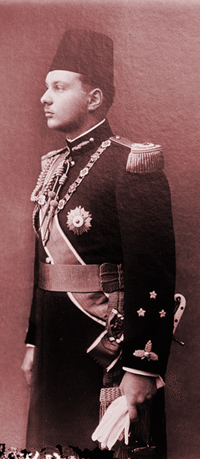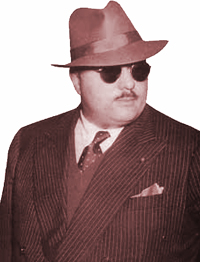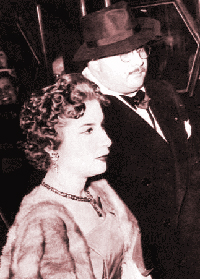
10 MILLIEMES COIN - KINGDOM OF EGYPT - KING FAROUK
(KM 364)
Date: A.D. 1941
Obverse: Portrait wearing hat head left - FAROUK I KING OF EGYPT
Reverse: Denomination and dates within tasseled wreath - EGYPTIAN KINGDOM 10 MILLIMAT 1941 - 1360 - Engraver: Percy Metcalfe
|
King Farouk I of Egypt was the last ruling King of Egypt. Born in 1920 he succeeding his father, Fuad I, at the age of 16. His full title was "His Majesty Farouk I, by the grace of God, King of Egypt and of Sudan, Sovereign of Nubia, of Kordofan and of Darfur". The young King was educated in England and was guided by his tutor Ahmed Pasha Hassanein, an Oxford educated renaissance man. He was a statesman, a diplomat, an Olympic champion in fencing, a decorated officer, a writer (in Arabic and English), and an explorer of the Libyan desert having explored the Sahara. He discovered the 'lost oasis', a water source that opened new Sahara routes from Kufra to Sudanic Africa. Under the tutelage of such a man, Farouk was well prepared for the life of a king and statesmen. The British hopes that he would guide his nation to further parliamentary government rule would soon be dashed, all the preparation in the world seemed unable to divert the young king from his obsession for wealth and extreme excess. Farouk was enamored by the glamorous royal lifestyle. Already fabulously wealthy with large estates, dozens of palaces and hundreds of cars, the king always wanted more. His appetite for food, women, and material goods seemed insatiable. He would travel the world on state visits and spend lavishly on extravagant shopping sprees and engaging in scandalous affairs. Sir Miles Lampson, the British high commissioner, described him in a report to the Foreign Office in 1937 as `uneducated, lazy, untruthful, capricious, irresponsible and vain, though with a quick superficial intelligence and charm of manner'. During his 16 year reign he did little more than indulge his tastes for fine food and luxurious living. As Egypt was suffering hard times during WWII, Farouk did not curb his extravagant lifestyle. He choose to keep all the lights in his Alexandrian palace on as the rest of the city was without power because of Italian bombing. Those things he could not buy he stole. A peculiar practice for a king, he began stealing valuable objects and artifacts while abroad including a sword belonging to the Shah of Iran and a pocket watch from Winston Churchill. He is said to have mastered the dubious art of pick pocketing and would practice this as he mingled at gatherings earning the nickname ' The Thief of Cairo'. This title referred not just to his penchant for stealing but his corrupt reign that fed his, and his cronies, lavish lifestyle. When he did turn his attention to matters of state he proved equally disappointing and self serving. He constantly plotted against the Wafd, Egypt's majority political party. They concluded the Anglo - Egyptian Treaty of 1936, which increased Egypt's autonomy but fell short of realizing complete independence from Britain. He contended with Britain over monarchical privilege and intrigued to enhance the sway of the monarchy over the Egyptian parliament. Political tensions came to a head in early 1942 while German military forces, under the command of General Erwin Rommel, were advancing in the western desert toward Alexandria. The British demanded a pro-British Wafdist ministry. When Farouk delayed, Miles Lampson, the British ambassador, surrounded Abdin Palace with tanks on February 4, 1942. Lampson compelled the monarch to install the Wafd government or be forced to abdicate. The first of many actions that was seen by many as undermining the legitimacy of parliamentary democracy which fostered resentment in the people who chaffed at British rule. In 1948 the Egyptian army took part in the Arab - Israel War as a member of the Arab League. Egypt took a commanding role in the Arab League. It had the largest population, universities, newspapers, and broadcasting stations in the Arab world having embraced industrialization more than its fellow member nations. The Arab League headquarters was situated in Cairo, and its secretary-general was an Egyptian. The countries in the Arab League all were driven by their own agendas which developed mistrust among its members weakening them as a united force. Egypt was hesitant to take action against Israel while there was a British presence there. All the same, King Farouk sent his loyal Egyptian army to help destroy the new state of Israel. In the end, Egypt suffered an embarrassing defeat and failed to capture the almost completely defenseless Negev desert. By early 1949, Israel occupied the Negev desert up to the Egypt-Palestine. The General Armistice Agreements (GAA) were signed between Israel and the Arab allies Egypt, Jordan, Lebanon, and Syria. Egypt was left in administrative control of Gaza city and its environs, and the Gaza strip was created. Farouk enjoyed less popular support in Egypt for his actions than the other Arab League nations. To this day, Egypt remains the only nation to conclude peace and have diplomatic relations with Israel. During this period, groups opposed to Farouk's government increased their following throughout the country, most notably the Muslim Brotherhood, the Communists, and the Socialists. Within the army an elite cadre of young officers organized themselves and formed the Free Officers movement. They saw King Farouk as a symbol of all that was wrong with the old order. Outrageously wealthy, he flaunted his wealth in a country wracked by poverty. His penchant for gambling and carousing with women offended many. In the end Farouk's scandalous and grotesquely self-indulgent lifestyle and his corrupt government had eroded the army's loyalty. Learning of the growing opposition to his rule inside the military, he tried to move on his enemies before they turned on him. He did not succeed. The Free Officers, led by Gamal Abdel Nasser, seized power on July 23, 1952. Three days later, on July 26, 1952, the new government exiled the king. He sailed from Alexandria harbor on the royal yacht Mahrussa accompanied by his family, gold ingots, and more than two hundred pieces of luggage. His deposition in 1952 effectively brought an end to the rule over Egypt of the royal family of Muhammad Ali. Farouk's infant son, Ahmad Fuad, succeeded briefly to the throne but in June 1953, Egypt abolished the monarchy and became a republic. The new regime quickly moved to auction off the King's vast collection of trinkets and stolen treasures. Among the more famous of his possessions was a rare 1933 Double Eagle coin, though the coin disappeared before it could be returned to the United States. Farouk continued to live a lavish life even in exile and continued his obsessive accumulation of material goods. His gluttony for fine cuisine soon made the former king dangerously obese, weighing nearly 300 pounds. An acquaintance described him as "a stomach with a head". He died in Rome on March 3, 1965 at the age of 45. He collapsed and died at the dinner table following a characteristically heavy meal. |



